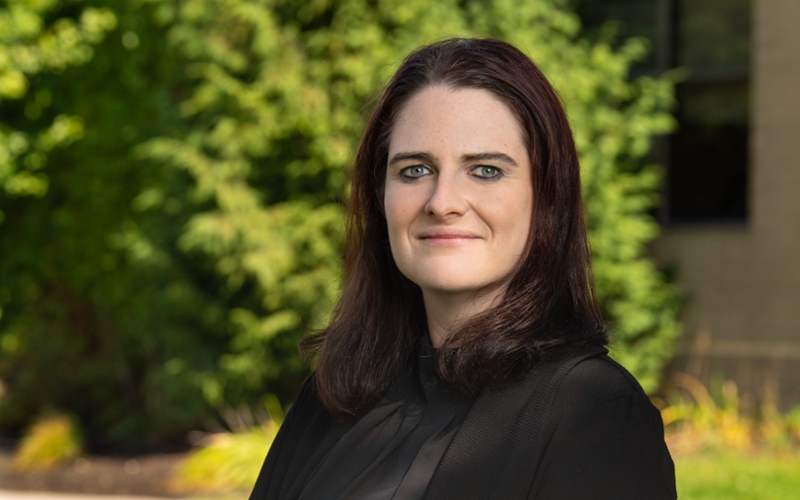Meet the chair: Dr. Julia Woodhall-Melnik, CRC in Resilient Communities
Author: UNB Research
Posted on Jan 14, 2022
Category: Research , Accolades

Meet the Chair: Dr. Julia Woodhall-Melnik, CRC in Resilient Communities
On January 12, the Government of Canada announced research funding that included $151 million in funding for 188 new and renewed research chairs at 43 institutions across Canada. We’re proud to have two of these new chairs here at UNB, joining the 9 other Canada Research Chairs at UNB.
Dr. Julia Woodhall-Melnik is the new Canada Research Chair in Resilient Communities, and she’s dedicated to making a positive impact on New Brunswick and the world’s communities by studying and improving housing security.
We spoke with Dr. Woodhall-Melnik about how she came into this field, and where she’s hoping to go; read on to find out more!
Who are you?
My name is Dr. Julia Woodhall-Melnik, and I am an associate professor of social science at UNB, the principal investigator of the Housing, Mobilization & Engagement Research Lab (HOME-RL), and the new Canada Research Chair in Resilient Communities.
I have a bachelor’s and a master’s degree in sociology from the University of Guelph, and I completed my PhD in sociology at the University of Waterloo. My early research focused on the experiences and choices of coffee shop and fast food workers.
However, while I was working on my doctorate, I received an internship opportunity with the Canadian Policy Research Network and the Ministry of Municipal Affairs and Housing in Ontario to explore differences in publicly subsidized housing models between Ontario, the United States and Australia.
Being able to explore this field and connect with others in it gave me a new direction, and when I finished my PhD, I received and took on two postdoctoral fellowships in Housing First and affordable housing research.
What are your areas of inquiry?
My current areas of interest are affordable and inclusive community housing options, the connections between housing affordability and mental health and wellbeing, and on solutions for improving living conditions for low to moderate income individuals. I also focus on youth housing and homelessness.
My work is largely driven by the needs of individuals experiencing poverty and the agencies that serve them. As a community-based researcher, I work to answer questions that are important to some of the most vulnerable members of our society. I chose this work because I think it has the most impact for people who really need it. I also chose this work because it challenges me.
I learn something new about housing, health, and our social systems every day. Interacting with the community, whether it be through discussions with people who are experiencing housing instability or the agencies that aim to help these folks, energizes me and inspires me to work to change things for people who are unjustly and unfairly denied access to basic human needs and rights because of circumstances that are more often than not related to inequitable systems.
What will having this CRC enable?
I hope to work with our broader community to use my research to create an evidence-based demonstration project that focuses on housing affordability, suitability and access.
For example, Sam Tsemberis’s work in New York has spread around the world, leading to people being housed. His model of providing housing for those who experience chronic homelessness had a significant impact on their ability to lead healthy and meaningful lives. I want to do the same thing for people who are hanging on to housing by a thread here in New Brunswick, across Canada, and across the world.
I want to develop a model for affordable housing that can help everyone live healthy and meaningful lives. Struggling under the stress of housing unaffordability is unfair, dangerous and unhealthy, and it doesn’t provide people with the mental space to thrive.
We need more evidence to get us there, though, and I hope my work can provide that.
Why is this work important, to you and to our communities?
It is really important to me as a researcher, social justice advocate, mother, friend and community member that we establish productive systems for ensuring that people have their basic needs met. I have three beautiful children that were lucky to be born into a stable home with access to economic and social resources.
I find it completely unfair that some parents are under constant stress to maintain roofs over their heads; that folks who have worked hard all their lives live in poverty in retirement; that youth who are just starting out cannot afford stability and the ability to grow; that people who experience disabilities and neurodiversity are regulated to poverty by social support systems that cannot provide enough to live but penalize them for working.
It’s unfair that our quality of life is largely dictated by where we are born. I want the opportunity to address these injustices in any way that I can, and this Chair will be an opportunity to start making our communities better, healthier and kinder, in a real way.